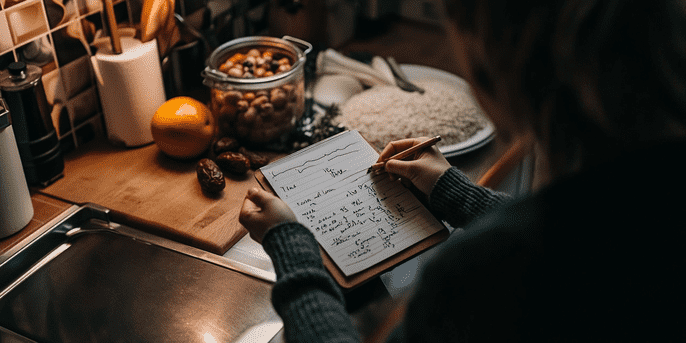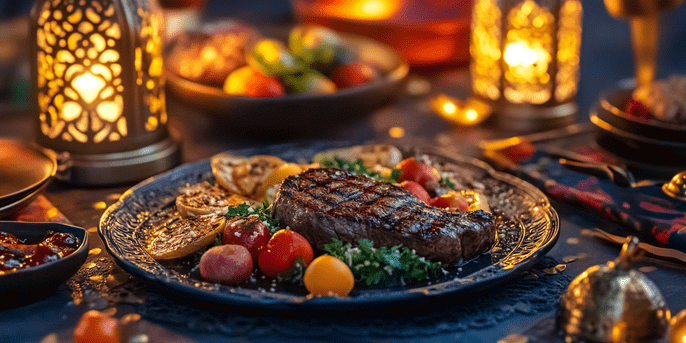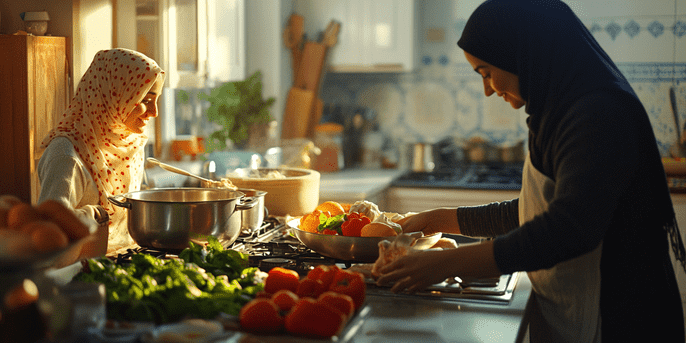Ramadan in the UAE brings spiritual reflection and communal feasts, but it can also strain your budget. By planning wisely, shopping smartly, and leveraging discounts, you can enjoy a fulfilling Ramadan without overspending. This guide will help you save money while ensuring your meals remain nutritious, delicious, and budget-friendly throughout the holy month.
Plan Your Grocery List in Advance

One of the most effective ways to save money during Ramadan is by planning your grocery shopping in advance. A well-structured plan ensures you buy only what you need, reducing waste and unnecessary expenses. Meal planning helps you make healthier choices while sticking to a budget. Tracking your pantry inventory prevents duplicate purchases, which can add up over time. By setting a realistic budget, you can allocate funds wisely and avoid last-minute shopping splurges.
- Create a weekly meal plan: Plan your Iftar and Suhoor meals in advance to ensure balanced nutrition. This helps avoid repetitive dishes and expensive takeout. A structured plan also streamlines grocery shopping, reducing unnecessary purchases.
- Check pantry inventory: Review what you already have before shopping to prevent duplicate buys. An organized pantry helps you use ingredients before they expire. This practice minimizes food waste and keeps your grocery list efficient.
- Set a budget: Determine a fixed grocery budget to control spending and avoid impulse buys. Budgeting apps can help track expenses and identify spending patterns. Prioritizing essentials over luxury items ensures financial discipline.
Pro Tip: Use budgeting apps like Noon Grocery or Carrefour UAE to track expenses and set shopping alerts for discounts.
Shop at the Right Places for Discounts
Finding the right supermarkets and online stores can help you maximize savings during Ramadan. Many retailers offer special promotions during the holy month, making it a great time to stock up on essentials. Some stores provide exclusive member discounts or cashback offers, adding to your overall savings. By comparing prices between different retailers, you can identify where the best deals are. Online shopping platforms often have bundle deals and free delivery options, further reducing expenses.
- Supermarket sales: Major retailers like Carrefour, Lulu Hypermarket, and Union Coop offer Ramadan discounts. Shopping during promotions helps you save more on bulk purchases.
- Online shopping: Sites like Amazon UAE, Kibsons, and Noon run exclusive Ramadan deals. Online shopping provides convenience and access to better discounts.
- Use discount codes: Platforms like SavePlus UAE offer promo codes for extra savings. Applying coupons at checkout reduces costs on groceries and household essentials.
Pro Tip: Compare online and offline prices before making a purchase to ensure you are getting the best available deals.
Buy in Bulk for Maximum Savings
Bulk buying is one of the best ways to stretch your Ramadan grocery budget. Many staple foods, such as rice, lentils, and cooking oil, have long shelf lives, making them ideal for bulk purchases. By buying in larger quantities, you can take advantage of wholesale prices and reduce frequent trips to the store. Bulk shopping also reduces packaging waste, making it a more sustainable choice. To avoid spoilage, proper storage is essential when buying perishable goods in bulk.
- Stock up on dry goods: Buying rice, flour, and lentils in bulk saves money and prevents frequent store runs. These staples are versatile and essential for many Ramadan meals.
- Invest in frozen foods: Frozen vegetables and meats offer convenience and retain their nutritional value. They provide flexibility in meal prep and have a longer shelf life.
- Look for wholesale markets: Local wholesale markets offer high-quality goods at lower prices. Buying in bulk from these stores helps you save more in the long run.
Pro Tip: Store bulk items in airtight containers to maintain freshness and avoid contamination or spoilage.
Prioritize Nutrient-Rich, Affordable Foods

Balancing nutrition and affordability is key to maintaining good health while fasting. During Ramadan, it’s essential to choose foods that provide sustained energy throughout the day. Whole grains, proteins, and fiber-rich foods should form the core of your meals. Instead of processed foods, focus on fresh ingredients that are both affordable and nutritious. Planning meals around these budget-friendly options ensures you get the most value for your money.
- Opt for plant-based proteins: Lentils, beans, and chickpeas are affordable protein sources rich in fiber. They promote better digestion and sustained energy during fasting.
- Choose seasonal produce: Locally grown fruits and vegetables are fresher, cheaper, and more nutritious. Shopping at local markets ensures better quality at lower prices.
- Buy whole grains: Brown rice, oats, and whole-wheat flour provide lasting energy and steady blood sugar levels. They are more nutrient-dense than refined grains, supporting overall health.
Pro Tip: Incorporate protein-rich foods into every meal to maintain energy levels and stay full for longer during fasting hours.
Minimize Food Waste to Cut Costs
Reducing food waste is essential for both saving money and promoting sustainability during Ramadan. Many households throw away food simply because of poor planning or improper storage. Implementing smart strategies can help extend the shelf life of groceries and reduce waste. Meal prepping and portion control also play a crucial role in minimizing leftovers. By making conscious choices, you can maximize the value of your groceries while contributing to a more sustainable lifestyle.
- Freeze leftovers properly: Store extra portions in airtight containers with date labels to keep them fresh. Freezing meals reduces spoilage and saves time on busy days.
- Use the FIFO method: "First In, First Out" helps use older groceries before new ones. Organizing food by expiration dates minimizes waste and prevents spoilage.
- Repurpose food creatively: Turn leftover rice into fried rice or overripe bananas into smoothies. Using ingredients creatively reduces waste and adds variety to meals.
Pro Tip: Keep a food waste log for a week to track what gets discarded, and adjust your shopping habits accordingly.
Leverage Cashback and Digital Payments
Using modern payment methods can help you save money on Ramadan groceries. Many banks and online platforms offer cashback and rewards when you shop at specific stores. Digital wallets and BNPL (Buy Now, Pay Later) services provide flexibility in managing grocery expenses. Choosing the right payment method can significantly reduce overall costs while earning extra rewards. The key is to maximize these financial tools without overspending.
- Use cashback credit cards: UAE banks like Emirates NBD and ADCB offer 5%-15% cashback on groceries. Paying balances on time ensures you maximize savings without interest charges.
- Try mobile payment apps: Apple Pay, Google Pay, and Payit offer exclusive deals and cashback. Many stores provide extra discounts for using digital payments instead of cash.
- Opt for BNPL services: Platforms like Tabby and Postpay let you split payments into installments. This helps manage bulk shopping expenses, but tracking payments is essential.
Pro Tip: Always check your bank's promotional offers before making large grocery purchases to maximize cashback rewards.
Cook at Home Instead of Ordering Takeout

Eating home-cooked meals during Ramadan is both healthier and more cost-effective. Preparing meals at home allows for better portion control, reducing the temptation to overeat. Cooking also gives you the flexibility to choose high-quality ingredients at lower costs. While restaurant meals can be convenient, they often come with extra charges like delivery fees and service tax. With a little planning, you can create delicious and affordable meals without sacrificing convenience.
- Prepare meals in batches: Cooking in bulk saves time and money while ensuring ready-to-eat meals. It’s perfect for busy days when cooking from scratch isn’t an option.
- Use simple, affordable ingredients: Budget-friendly staples like lentils, rice, and eggs make nutritious meals. With the right spices, simple ingredients can be both tasty and cost-effective.
- Limit processed and convenience foods: Pre-packaged meals are costly and often contain unhealthy preservatives. Homemade meals are fresher, healthier, and more budget-friendly.
Pro Tip: Invest in a slow cooker or pressure cooker to save time and energy while preparing large meals efficiently.
Take Advantage of Ramadan Charity Offers
Many organizations in the UAE provide charitable food programs during Ramadan. Taking advantage of these programs can help stretch your budget while supporting a good cause. Supermarkets and local businesses also offer special discounts on food packs to promote community welfare. If you have extra, consider giving back by donating food to those in need. Engaging in charitable initiatives enhances the true spirit of Ramadan.
- Join community food programs: Ramadan Fridges and local initiatives offer free essential groceries. Many neighborhoods run donation drives to help those in need.
- Buy charity food packs: Supermarkets sell discounted Ramadan food boxes with essentials like rice and flour. These packs make it easier for low-income families to access meals.
- Donate wisely: Support charities like Emirates Red Crescent to fund meal distribution programs. Even small donations help provide food for those facing insecurity.
Pro Tip: If you're buying charity food packs, purchase in bulk to reduce costs and distribute them among multiple families.
Compare Grocery Prices to Find the Best Deals
Shopping smartly requires staying informed about where to find the best grocery deals. Prices for essential items vary across different supermarkets, so comparing them helps in making cost-effective choices. Many grocery stores in the UAE update their promotions weekly, making it essential to stay up-to-date. Using price comparison tools ensures you get the best value for your purchases. By adopting this habit, you can cut costs significantly over the course of Ramadan.
- Use price comparison tools: Apps like YallaCompare help you find the best grocery prices. Some platforms even notify you of price drops on specific items.
- Monitor weekly promotions: Stores like Carrefour and Lulu Hypermarket update Ramadan deals regularly. Checking flyers and digital promotions helps you plan and save more.
- Join loyalty programs: Supermarket reward systems let you earn points for future discounts. Frequent shoppers can redeem points for groceries and cut costs over time.
Pro Tip: Follow your favorite supermarkets on social media to stay updated on exclusive deals and limited-time discounts.
Conclusion
Smart grocery shopping during Ramadan helps you save money while maintaining a nutritious and fulfilling diet. By planning meals, shopping strategically, and leveraging discounts, you can manage expenses effectively. Avoiding waste, buying in bulk, and cooking at home further enhance savings. Follow these practical tips to enjoy a cost-effective Ramadan while focusing on what truly matters—faith, family, and community.
Head over to SavePlus UAE for expert shopping tips, exclusive discount codes, and the best Ramadan deals. Maximize your savings and enjoy a budget-friendly, fulfilling Ramadan!
FAQ
What are the best ways to save money on Ramadan grocery shopping?
Planning meals, buying in bulk, and using discount codes can significantly reduce expenses.
Which supermarkets offer the best Ramadan discounts in the UAE?
Carrefour, Lulu Hypermarket, and Union Coop provide extensive Ramadan discounts and promotions.
How can I minimize food waste while shopping for Ramadan?
Use the FIFO (First In, First Out) method, freeze leftovers, and store ingredients properly.
Is online grocery shopping cheaper during Ramadan?
Yes, platforms like Noon, Amazon UAE, and Kibsons offer exclusive discounts and free delivery.
How can I ensure a healthy diet while shopping on a budget?
Focus on whole grains, plant-based proteins, and seasonal produce to maintain nutrition at lower costs.






